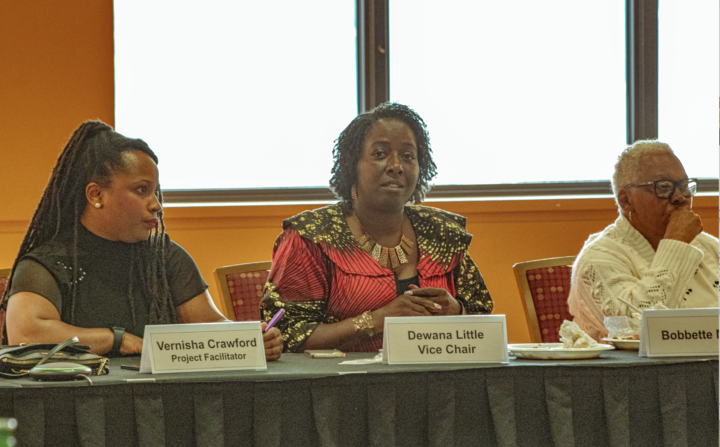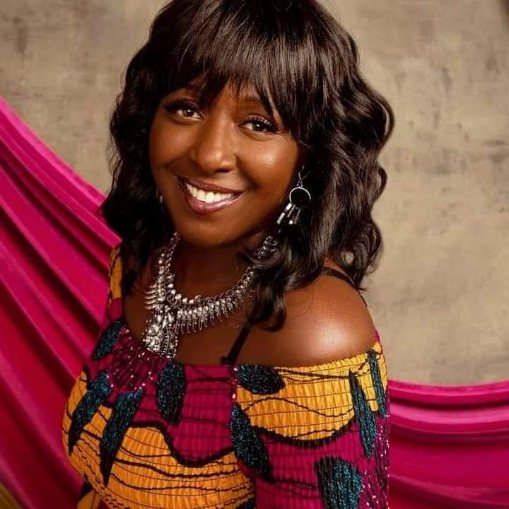Heartfelt emotion seeps out of Dewana Little when she is asked about her hometown.
The fourth-generation Ashevillean’s deep appreciation for her roots propels her to give the next generation of Black residents — including her three children — something to honor.
Little, a real estate agent and diversity consultant, became chair of the Community Reparations Commission in June after previous chair Dwight Mullen stepped down. Little had served as vice chair of the commission.
She says she got involved in reparations after the murder of George Floyd by a Minneapolis police officer in 2020 because she recognized that the Black community in Asheville had been “addressing the symptoms of exclusion” for many generations, and she wanted to help her community thrive instead of simply survive.
“I want to be a part of actually fixing the problem instead of just treating the symptoms,” she says.
Little is the founder of Positive Changes Youth Ministries, which works to empower and provide a platform for Black youths to succeed by encouraging them to attend college. She also worked as water quality educator and community engagement coordinator at Asheville GreenWorks, where she oversaw the Youth Environmental Leadership Program, a summer internship program primarily for Black, Indigenous and students of color. From 2018-23, Little served as executive director of the YMI Cultural Center, which works to celebrate the cultural heritage of the Black community through arts and traditions, according to its website.
She is inspired by her 18-year-old son, who wants to be president. She also has another 18-year-old son and a 4-year-old daughter, who sipped apple juice during a recent interview with Xpress at an area coffee shop.
“I don’t want her to have to navigate the systems that I had,” she says with a nod to her daughter.
The conversation is the first in a series of interviews with members of Asheville’s Black community involved in the effort to establish reparations for those who have been affected by generations of systemic racism in Asheville and Buncombe County. The commission wrapped up two years of monthly meetings in July and plans to ask for an extension at an Asheville City Council meeting Tuesday, Aug. 27.
Xpress: It seems as if your existence is wrapped up in advocacy work for Black residents of Asheville. How do you keep up the energy for this work?
Little: I do it for my city because I love my city. I love the people. The good, the bad, all of it. I love my city, and I know it could be better. I know we have the capacity to be an amazing city.
Does it bring you pride that Asheville is working to address reparations?
Of course. Definitely. I think about my grandma and how she helped raise me and her experiences and the challenges she faced. I think about my great-grandma and the experiences and challenges she faced. I think about my family and my friends. I remember it used to be so different here. Yes, there were closed-down buildings downtown. But we were a close-knit community.
I grew up when Blackness was great, when Blackness was very visible here. This is my city. To see it now and how gentrified it is, and how hard it is to find affordable housing and Asheville and Buncombe County caters more to the tourists, [it’s hard].
I grew up seeing Black businesses, seeing Black people. I grew up where anything was possible. I was able to see that it was possible because I grew up seeing people that look like me in those positions doing those things. My kids didn’t have that luxury. I had to become that for them. I had to become their “anything is possible.” If I wasn’t going to show them, who was?
Do you feel like the reparations commission’s work thus far has been a valuable process?
Productivity-wise, everybody has been dedicating their time and energy to this process and really trying to come up with solutions that will have intergenerational impact. We recognize that we’re dealing with intergenerational issues. The oppression, exclusion and marginalization of Black people didn’t start this year when we started this process; it’s been generations. How do we address the systemic issues that perpetuate and maintain the status quo of harm to Black people?

We wanted to hear from the youth because they are going to bring a different perspective to the table, a different way of viewing solutions, as well. And they are our future. So, when we have done everything we can do, then our youths can step up and be able to carry the work forward.
Some more senior members of the commission have said that there is value in hearing the perspectives of those in the older generation. How do you balance those voices with those in the younger generation?
Historically, in Black communities, traditions and culture are passed down. It’s through that transfer of knowledge that bridges the gap because now you can see from the elder’s perspective, based on their experiences, and the things that they had overcome and learned from.
I don’t think one is more important than the other. But I mean, it takes both. So I’ve been looking at approaches with some of the [communities we’ve reached through] community engagement on how we can do that transfer of knowledge. And maybe pairing an elder with a youth and having a day out for the elders and the youth to be able to get together, have those conversations and share experiences.
Do you feel like the messaging from the city and county has changed since the beginning of this process in terms of what can really be done?
I feel like there was a lot of transition in our process. With that transition came new people in positions of management or leadership of this process and oversight. Each shift brings a new perspective to the table and a new vision for the way this process works, even though the people at the table haven’t changed. Our vision, our process and how we have agreed that we want to see this work out hasn’t shifted, but the conversation when it comes to leadership and management as far as city and county oversight … has posed boundaries.
It still sets the limitation of what reparations [can be]. … What about the fight, the fight that I felt that they had in the beginning? It feels like the city and county leaders are over this process.
How would you define where the reparations process is right now?
This is not a check-the-box moment. This is not a “we tried’ moment,” this is a “we’ve got to make this happen” moment, for our elders, for our youth, for the generations to come.
So right now, we’re at this crucial point. We have recommendations that we can start implementing, given the resources and support that we already created, and we still have work to do. Now it’s time to shift to focus on the policies and practices and procedures that are in place, the laws that are in place that perpetuate the harm on Black people.
What has been the biggest success so far?
Us coming together and being able to do the work. Even though we don’t agree, we can agree to disagree. At the end of every meeting, everybody is talking to everybody. I don’t care what the conversation was during the meeting, whether people see eye to eye or not; everybody’s talking to everybody with love in community. We really created a community space where we are actually doing this work together.
What’s been the hardest part?
People. In a process that has never been done, you have to manage expectations while also trying to come up with solutions and building the process. We were building this process while we were working on this process. Building and doing at the same time while also addressing the issues that are still happening in the community and being present and showing up. So managing people’s expectations outside of this process [has been difficult.]




As in CA, this project is destined to fail. It was destined to fail from day 1. All the process has done is raise expectations that are never going to be fulfilled. Race based goodies are not going to be distributed. Class based initiatives to address problems like affordable housing can be considered, although the scale of the problem is likely well beyond the city’s capacity.
Racism vis a vis reparations… it’s a fraught equation, but a necessary one. One seems inherent sadly, the other blessedly intentional… the best kind of intentions of course in this case. And socio-economic inequalities… well they seem almost inevitable when we look at our collective human history, sigh. Anyway, big questions ..and as always big problems to address. Thank you Ms. Little and your fellow sojourners for all your efforts in delving into this morass …hopefully something will come of all of it ….probably something already has. Keep moving forward with it!
What has come out of the process thus far, other than the expenses?
allowing governmental racism becomes demonstrated more every day … she’s hung up on gentrification which occurs everyday in all prosperous cities. deal widdit.